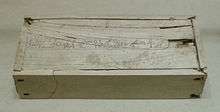Merenre Nemtyemsaf I
Merenre Nemtyemsaf I (reigned 2287–2278 BC) was the fourth king of the Sixth Dynasty of Egypt. His nomen, theophorically referring to Nemty, was formerly read as Antyemsaf, a reading now known to be incorrect.
| Merenre | |||||||||||||||||||||||||||||||||||||||||||||||||||||||||||||||||||||||||||||||||||||||||||||||||
|---|---|---|---|---|---|---|---|---|---|---|---|---|---|---|---|---|---|---|---|---|---|---|---|---|---|---|---|---|---|---|---|---|---|---|---|---|---|---|---|---|---|---|---|---|---|---|---|---|---|---|---|---|---|---|---|---|---|---|---|---|---|---|---|---|---|---|---|---|---|---|---|---|---|---|---|---|---|---|---|---|---|---|---|---|---|---|---|---|---|---|---|---|---|---|---|---|---|
| Antyemsaf | |||||||||||||||||||||||||||||||||||||||||||||||||||||||||||||||||||||||||||||||||||||||||||||||||
 A small wooden box inscribed with the names and titles of Merenre Nemtyemsaf I, Musée du Louvre | |||||||||||||||||||||||||||||||||||||||||||||||||||||||||||||||||||||||||||||||||||||||||||||||||
| Pharaoh | |||||||||||||||||||||||||||||||||||||||||||||||||||||||||||||||||||||||||||||||||||||||||||||||||
| Reign | 2287–2278 BC 9 years (6th Dynasty) | ||||||||||||||||||||||||||||||||||||||||||||||||||||||||||||||||||||||||||||||||||||||||||||||||
| Predecessor | Pepi I Meryre | ||||||||||||||||||||||||||||||||||||||||||||||||||||||||||||||||||||||||||||||||||||||||||||||||
| Successor | Pepi II Neferkare | ||||||||||||||||||||||||||||||||||||||||||||||||||||||||||||||||||||||||||||||||||||||||||||||||
| |||||||||||||||||||||||||||||||||||||||||||||||||||||||||||||||||||||||||||||||||||||||||||||||||
| Children | Ankhesenpepi III | ||||||||||||||||||||||||||||||||||||||||||||||||||||||||||||||||||||||||||||||||||||||||||||||||
| Father | Pepi I Meryre | ||||||||||||||||||||||||||||||||||||||||||||||||||||||||||||||||||||||||||||||||||||||||||||||||
| Mother | Ankhesenpepi I | ||||||||||||||||||||||||||||||||||||||||||||||||||||||||||||||||||||||||||||||||||||||||||||||||
Biography
Merenre was a son of Pepi I and Ankhesenpepi I, and grandson of the female vizier Nebet and her spouse Khui.
While Merenre Nemtyemsaf was once believed to have served as a brief co-regent to his father Pepi I Meryre before ruling in his own right, the publication of the South Saqqara Stone annal document in 1995 by Vassil Dobrev and Michel Baud shows that Merenre directly succeeded his father in power with no interregnum or coregency. The badly damaged document preserves the record of Pepi I's final year—his 25th Count and proceeds immediately to the first year count of Merenre[1] Merenre shared his father's fascination with Nubia and continued to explore deep into the region. He also began a process of royal consolidation, appointing Weni as the first governor of all of Upper Egypt and expanding the power of several other governors. While he was once assumed to have died at an early age, recent archaeological discoveries discount this theory. Two contemporary objects suggests that Merenre's reign lasted slightly more than a decade. The South Saqqara Stone Annals preserves his Year after the 2nd Count[2] whereas Merenre's Year after the 5th Count (Year 10 if the count was biennial) is attested in a quarry inscription from Hatnub Inscription No.6, according to Anthony Spalinger.[3]
The same South Saqqara Stone – which was created during Pepi II's reign – credits Merenre with a minimum reign of 11 to 13 years, however (based on a strictly biennial count), which would increase Merenre's reign length from the more traditional figure of 5 to 6 years.[4] The British Egyptologists Ian Shaw and Paul Nicholson in a 1995 book raised Merenre I's reign from the traditional 6 year figure to 9 years.[5] However, they were unaware of the contents of the South Saqqara Stone which was published in the same year by Baud & Dobrev and shows that Merenre had a minimum reign of 11 years with no co-regency with his father, Pepi I. One must note that cattle counts were not always biennial; for example, 18 had been performed by the 30th year of Pepi I's reign. It is therefore entirely possible that Merenre ruled for fewer than 11 years.
Sixth dynasty royal seals and stone blocks found at Saqqara demonstrate that Merenre's aunt, Queen Ankhesenpepi II, was the wife of both Pepi I and then Merenre himself. Since the South Saqqara Stone shows Merenre's reign intervened between Pepi I and Pepi II and lasted for a minimum of slightly over a decade, this indirectly indicates that Merenre I was actually Pepi II's father, rather than Pepi I as was traditionally assumed. Merenre's daughter was Ankhesenpepi III, the future wife of Pepi II.
References
- Michel Baud, Vassil Dobrev, De nouvelles annales de l'Ancien Empire égyptien. Une "Pierre de Palerme" pour la VIe dynastie, BIFAO 95 (1995), pp.23-92
- Baud & Dobrev, BIFAO 95 (1995), pp.23-92
- Anthony Spalinger, Dated Texts of the Old Kingdom, SAK 21 (1994), p.307
- Baud & Dobrev, BIFAO 95 (1995), pp.23-92
- Ian Shaw and Paul Nicholson, The Dictionary of Ancient Egypt, London, 1995, p.220
